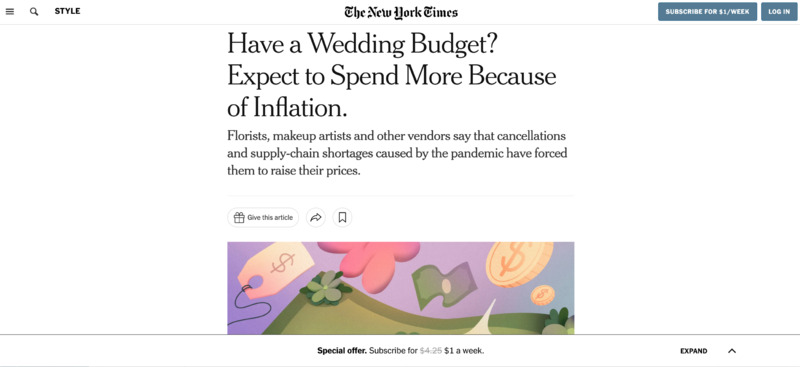Item
Have a Wedding Budget? Expect to Spend More Because of Inflation
Title (Dublin Core)
Have a Wedding Budget? Expect to Spend More Because of Inflation
Description (Dublin Core)
This story from the New York Times by Danielle Braff talks about the rising costs of weddings as a result from COVID. Couples mentioned in this story go on about how just the basics are more expensive than they used to be. Ms. Alvear-Beceiro and Mr. Klebba, despite not spending extra on things like food, decorations, and music, had a wedding budget that topped $30,000. Zola, a wedding planning site, said that a third of the 468 participating vendors had losses of $50,000 or more due to couples postponing weddings in 2020. Supply chain shortages later on have also helped increase the overall costs, and many businesses are still trying to operate to pre-pandemic levels. Due to rising costs, some couples are choosing to scale back the festivities. Shannon Bernadin, after looking at the costs of wedding venues with her husband, decided to have a wedding at a friend's house and use thrifted outfits, along with homemade decor. All in all, this article demonstrates the changing economy and how that has impacted the wedding industry and how people plan weddings.
Date (Dublin Core)
March 30, 2022
Creator (Dublin Core)
Danielle Braff
Event Identifier (Dublin Core)
HST580
Partner (Dublin Core)
Arizona State University
Type (Dublin Core)
Text story
Link (Bibliographic Ontology)
Controlled Vocabulary (Dublin Core)
English
Consumer Culture (shopping, dining...)
English
Economy
English
Events
Curator's Tags (Omeka Classic)
wedding
vendor
budget
inflation
supply chain
postponement
increase cost
Contributor's Tags (a true folksonomy) (Friend of a Friend)
wedding
economy
supply chain
vendor
inflation
scaled back
business
Collection (Dublin Core)
COVID Bride
Linked Data (Dublin Core)
Date Submitted (Dublin Core)
03/31/2022
Date Modified (Dublin Core)
03/31/2022
O4/11/2022
08/02/2022
Date Created (Dublin Core)
03/30/2022
Item sets
This item was submitted on March 31, 2022 by [anonymous user] using the form “Share Your Story” on the site “A Journal of the Plague Year”: https://covid-19archive.org/s/archive
Click here to view the collected data.

